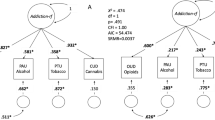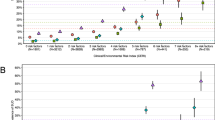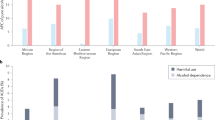Abstract
In influencing risk for psychiatric and substance use disorders, genes are typically conceptualized as working in silent physiological pathways in the bowels of our biology, far from the influences of human desires. I here argue that this model of gene action is too restricted. At the individual, family and societal level, humans can, through their decision-making capacity, intervene in causal pathways from genes to behavior. At the individual level, I present four paradigmatic cases involving alcohol dependence, major depression, general externalizing behaviors and animal phobia showing how human decisions can inhibit the expression of risk genes. I review the literatures demonstrating that parental behaviors can suppress or augment the heritability of traits in their children, and social attitudes can alter and even create causal pathways from genes to phenotypes. We evolved from organisms whose nervous systems were networks of reflexes that then developed simple cognitive systems and finally self-reflection. Just as our cognitions have gone ‘meta,’ we are now nearing a time when we can go ‘meta’ about our genetic risk. For many psychiatric disorders, our risk genes are not entirely cordoned off in our silent, purposeless biological substrate. Rather, we are able to make decisions that impact on the expression of our own genomes, those of our loved ones and those of our friends and neighbors. Our actions and our genes are often weaved together, integrated into the fabric of our lives.
This is a preview of subscription content, access via your institution
Access options
Subscribe to this journal
Receive 12 print issues and online access
$259.00 per year
only $21.58 per issue
Buy this article
- Purchase on Springer Link
- Instant access to full article PDF
Prices may be subject to local taxes which are calculated during checkout
Similar content being viewed by others
References
Dennett DC . Elbow Room: The Varieties of Free Will Worth Wanting. Bradford Books, 1984.
Goodwin DW . Adoption studies of alcoholism. Prog Clin Biol Res 1981; 69, Pt C 71–76.
Heath AC, Bucholz KK, Madden PA, Dinwiddie SH, Slutske WS, Bierut LJ et al. Genetic and environmental contributions to alcohol dependence risk in a national twin sample: consistency of findings in women and men. Psychol Med 1997; 27: 1381–1396.
Prescott CA, Kendler KS . Genetic and environmental contributions to alcohol abuse and dependence in a population-based sample of male twins. Am J Psychiatry 1999; 156: 34–40.
Shen YC, Fan JH, Edenberg HJ, Li TK, Cui YH, Wang YF et al. Polymorphism of ADH and ALDH genes among four ethnic groups in China and effects upon the risk for alcoholism. Alcohol Clin Exp Res 1997; 21: 1272–1277.
Edenberg HJ, Dick DM, Xuei X, Tian H, Almasy L, Bauer LO et al. Variations in GABRA2, encoding the alpha 2 subunit of the GABA(A) receptor, are associated with alcohol dependence and with brain oscillations. Am J Human Genet 2004; 74: 705–714.
Harburg E, Davis DR, Caplan R . Parent and offspring alcohol use; imitative and aversive transmission. J Stud Alcohol 1982; 43: 497–516.
Harburg E, DiFranceisco W, Webster DW, Gleiberman L, Schork A . Familial transmission of alcohol use: II. Imitation of and aversion to parent drinking (1960) by adult offspring (1977)--Tecumseh. Michigan. J Stud Alcohol 1990; 51: 245–256.
Kendler KS, Genes Prescott CA . Understanding the Causes of Psychiatric and Substance Use Disorders. Environment, and Psychopathology 1st ed New York: Guilford Press (July 26, 2006) 2006.
Kandel DB . On processes of peer influences in adolescent drug use: a developmental perspective. Adv Alcohol Subst Abuse 1985; 4: 139–163.
Kendler KS, Gardner CO, Prescott CA . Toward a comprehensive developmental model for alcohol use disorders in men. Twin Res Hum Genet 2011; 14: 1–15.
Kendler KS, Jacobson K, Myers JM, Eaves LJ . A genetically informative developmental study of the relationship between conduct disorder and peer deviance in males. Psychol Med 2008; 38: 1001–1011.
Kendler KS, Jacobson KC, Gardner CO, Gillespie NA, Aggen SH, Prescott CA . Creating a social world: a developmental study of peer deviance. Arch Gen Psychiatry 2007; 64: 958–965.
Leve LD, Kerr DC, Shaw D, Ge X, Neiderhiser JM, Scaramella LV et al. Infant pathways to externalizing behavior: evidence of genotype x environment interaction. Child Dev 2010; 81: 340–356.
Kendler KS, Sham PC, MacLean CJ . The determinants of parenting: an epidemiological, multi-informant, retrospective study. Psychol Med 1997; 27: 549–563.
Dick DM, Viken R, Purcell S, Kaprio J, Pulkkinen L, Rose RJ . Parental monitoring moderates the importance of genetic and environmental influences on adolescent smoking. J Abnorm Psychol 2007; 116: 213–218.
Boomsma DI, de Geus EJ, van Baal GC, Koopmans JR . A religious upbringing reduces the influence of genetic factors on disinhibition: evidence for interaction between genotype and environment on personality. Twin Res 1999; 2: 115–125.
McGovern RJ, Neale MC, Kendler KS . The independence of physical attractiveness and symptoms of depression in a female twin population. J Psychol 1996; 130: 209–219.
Silventoinen K, Sammalisto S, Perola M, Boomsma DI, Cornes BK, Davis C et al. Heritability of adult body height: a comparative study of twin cohorts in eight countries. Twin Res 2003; 6: 399–408.
Rowe DC, Clapp M, Wallis J . Physical attractiveness and the personality resemblance of identical twins. Behav Genet 1987; 17: 191–201.
Langlois JH, Kalakanis L, Rubenstein AJ, Larson A, Hallam M, Smoot M . Maxims or myths of beauty? A meta-analytic and theoretical review. Psychol Bull 2000; 126: 390–423.
Hamermesh DS, Biddle JE . Beauty and the labor market. Am Econ Rev 1994; 84: 1174–1194.
Mobius MM, Rosenblat TS . Why beauty matters. Am Econ Rev 2006; 96: 222–235.
Kendler KS, Thornton LM, Pedersen NL . Tobacco consumption in Swedish twins reared apart and reared together. Arch Gen Psychiatry 2000; 57: 886–892.
Williams B . Moral Luck. Cambridge University Press, 1982.
Tsuang MT, Bar JL, Harley RM, Lyons MJ . The harvard twin study of substance abuse: what we have learned. Harv Rev Psychiatry 2001; 9: 267–279.
Kendler KS, Karkowski LM, Neale MC, Prescott CA . Illicit psychoactive substance use, heavy use, abuse, and dependence in a US population-based sample of male twins. Arch Gen Psychiatry 2000; 57: 261–269.
Kendler KS, Sundquist K, Ohlsson H, Palmer K, Maes H, Winkleby MA et al. Genetic and familial-environmental influences on risk for drug abuse: a National Swedish Adoption study. Arch Gen Psychiatry 2012; 69: 690–697.
King MC, Marks JH, Mandell JB . Breast and ovarian cancer risks due to inherited mutations in BRCA1 and BRCA2. Science. 2003; 302: 643–646.
Schaffner KF, McGorry PD . Preventing severe mental illnesses--new prospects and ethical challenges. Schizophr Res 2001; 51: 3–15.
Dennett DC . Kinds of Minds: Toward and Understanding of Consciousness (Science Masters). Basic Books: New York, NY, 1997.
Locke Jz, An Essay Concerning Human Understanding (1690) New York: Dover, 1959 A.C. Fraser Edition 1959.
Dawkins R . The Selfish Gene Oxford University Press: New York, NY, USA, 1990.
Kendler KS . Twin studies of psychiatric illness: an update. Arch Gen Psychiatry 2001; 58: 1005–1014.
Kendler KS, Baker JH . Genetic influences on measures of the environment: a systematic review. Psychol Med 2007; 37: 615–626.
Scarr S, McCartney K . How people make their own environments: a theory of genotype greater than environment effects. Child Dev 1983; 54: 424–435.
Kendler KS, Jaffee SR, Romer D . The Dynamic Genome and Mental Health. Oxford University Press: New York, NY, 2011.
Kendler KS, Comment: Disclosures of Agency in Psychiatric Syndromes (Sub-Chapter of Chapter 7: Self-agency and Mental Causaligy by Shaun Galagher)In: Kendler KS, Parnas J, editors. Philosophical Issues in Psychiatry: Explanation, Phenomenology, and Nosology First edn The Johns Hopkins University Press: Baltimore, MD, 2008 pp 312–324.
Elster J . Strong Feelings: Emotion. Addiction, and Human Behavior (Jean Nicod Lectures) 1st edn. The MIT Press: Cambridge, MA, 1999.
Wallace RJ . Addiction as defect of the will: some philosophical reflections. Law Philos 1999; 18: 621–654.
Vohs KD, Baumeister RF . Addiction and free will. Addict Res Theory. 2009; 17: 231–235.
Kane RA . Contemporary Introduction to Free Will. Oxford University Press: New York, NY, 2005.
Tibben A . Predictive testing for Huntington's disease. Brain Res Bull. 2007; 72: 165–171.
Klitzman R, Am I . My Genes? Confronting Fate and Family Secrets in the Age of Genetic Testing 1st edn. Oxford University Press: New York, NY, USA, 2012.
Trippitelli CL, Jamison KR, Folstein MF, Bartko JJ, DePaulo JR . Pilot study on patients' and spouses' attitudes toward potential genetic testing for bipolar disorder. Am J Psychiatry 1998; 155: 899–904.
Wilde A, Meiser B, Mitchell PB, Hadzi-Pavlovic D, Schofield PR . Community interest in predictive genetic testing for susceptibility to major depressive disorder in a large national sample. Psychol Med 2011; 41: 1605–1613.
Leshner AI . Addiction is a brain disease, and it matters. Science. 1997; 278: 45–47.
West R . Theory of Addiction 1st edn. Wiley-Blackwell: Addiction Press: Oxford, UK, 2006.
Kendler KS . The dappled nature of causes of psychiatric illness: replacing the organic-functional/hardware-software dichotomy with empirically based pluralism. Mol Psychiatry 2012; 17: 377–388.
Acknowledgements
Supported in part by NIH Grants AA011408 and DA030005. Several key ideas expressed here arose during discussions with John Campbell, PhD, Peter Zachar, PhD, and Richard Bonnie, LLB, and provided helpful comments on earlier versions of this essay. Jennifer Kendler assisted in writing the story of James. This paper was based on the 14th P. Browning Hoffman Memorial Lecture delivered at the University of Virginia's School of Law on September 7, 2011.
Author information
Authors and Affiliations
Corresponding author
Ethics declarations
Competing interests
The author declares no conflict of interest.
Rights and permissions
About this article
Cite this article
Kendler, K. Decision making in the pathway from genes to psychiatric and substance use disorders. Mol Psychiatry 18, 640–645 (2013). https://doi.org/10.1038/mp.2012.151
Received:
Revised:
Accepted:
Published:
Issue Date:
DOI: https://doi.org/10.1038/mp.2012.151
Keywords
This article is cited by
-
Neurobiologie der Opioidabhängigkeit
Zentralblatt für Arbeitsmedizin, Arbeitsschutz und Ergonomie (2019)
-
Neurobiologie der Opioidabhängigkeit
Der Anaesthesist (2019)
-
Nurturing Our Better Nature: A Proposal for Cognitive Integrity as a Foundation for Autonomous Living
Behavior Genetics (2019)
-
Neurobiologie der Opioidabhängigkeit
Der Schmerz (2018)
-
An overview of the neurobiology of suicidal behaviors as one meta-system
Molecular Psychiatry (2015)



